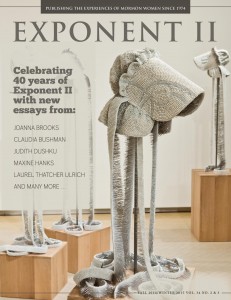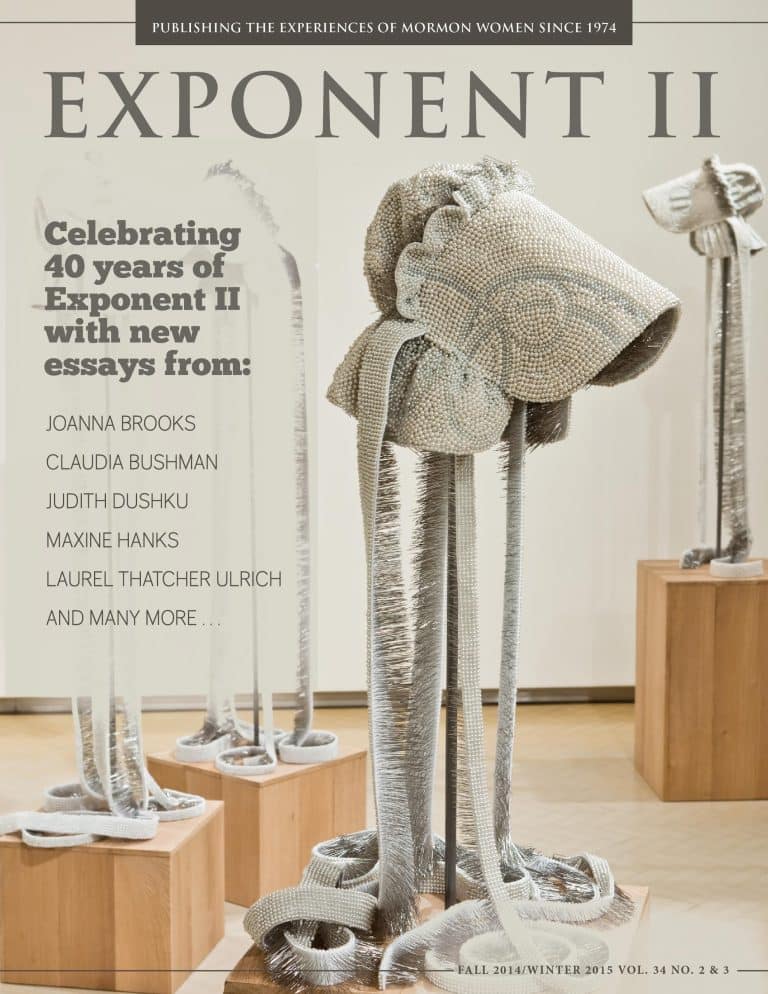 Exciting news! The double issue for Fall 2014 and Winter 2015 is in production and will be mailed on April 30th. You don’t want to miss this 68-page celebration of Exponent II’s 40 years in publication with writings from so many beloved Mormon feminists like Gina Colvin and Lavina Fielding Anderson (not to mention the ones listed on the cover)!
Exciting news! The double issue for Fall 2014 and Winter 2015 is in production and will be mailed on April 30th. You don’t want to miss this 68-page celebration of Exponent II’s 40 years in publication with writings from so many beloved Mormon feminists like Gina Colvin and Lavina Fielding Anderson (not to mention the ones listed on the cover)!
Our Letter from the Editor comes from former assistant https://exponentii.org/wp-content/uploads/2021/12/IMG_5173-scaled-2.jpg and Exponent permablogger, Heather Sundahl. Heather is entering her 20th year of Exponent II involvement, and there’s no one better to introduce this issue, the last piece of our 40th anniversary celebration.
Whenever people talk about Exponent II’s origin story, the word “discover” is always used. In 1972 Susan Kohler “discovered” a stack of original Woman’s Exponents published a century earlier whose purpose was to advocate for “the Rights of the Women of Zion, and the Rights of the Women of all Nations.” And as you can read in the retrospective essays of Claudia Bushman, Laurel Ulrich and Judy Dushku, within two years of that unearthing a brave group of women in Cambridge would decide that the time was right to start anew.
But the birth of Exponent II is a discovery in other ways as well. I love listening to women talk about how and when they “discovered” Exponent II. Some found stacks of old issues in their feminist aunt’s house. Others discovered it as it was passed to them by a friend, a visiting teacher, a mother-in-law. Maxine Hanks found it in the library at Ricks college and remarks in her essay that she “felt like she’d stumbled into a secret club, a hive of free thinking feminist…. Their voices were like a beacon of light piercing the night in Idaho.” My own discovery came when I moved to the Boston area in 1996 and immediately met Judy Dushku and Linda Hoffman Kimball who introduced me to the ward, the town, and Exponent II. I had spent so much time feeling so alone in my feminism, that reading the paper was a revelation to me. It was as if I’d finally come home.
Another way that Exponent II promotes discovery is that we have always encouraged first time writers. For nearly ten years I served as an https://exponentii.org/wp-content/uploads/2021/12/IMG_5173-scaled-2.jpg and it was a privilege to witness women “discover” their voices as they told their stories and shared their wisdom. It changes people to record their story. Instead of something happening to them, the writing process allows the teller to claim and shape the events of their lives. There is catharsis. Insight. Discovery. As an https://exponentii.org/wp-content/uploads/2021/12/IMG_5173-scaled-2.jpg I often approached women and asked them to write for us. “Who me?” they replied. “But I have nothing to say.” It still amazes me how a woman’s “nothing” has often turned out to be the most exquisite essay, or poetry, or art. I remember asking a very young Aimee Evans Hickman to write an essay version of her retreat introduction on her experiences with mother goddesses in South America. She put up a fight but eventually handed over a story whose imagery of falling petals is with me to this day. Past https://exponentii.org/wp-content/uploads/2021/12/IMG_5173-scaled-2.jpgs of the magazine were asked what their favorite stories were and we have the honor of reprinting articles selected by Sue Booth-Forbes, Sue Howe, Nancy Dredge, and Emily Clyde Curtis.
Of course we readers are also part of the discovery as we follow along on the journey and are moved or angered or changed in some way by the things we read. Most recently our issue on Women and the Priesthood opened many dialogues and has even become recommended reading in some wards and stakes. And yet for many women, Exponent II does not reach far enough. Aimee Evans Hickman’s essay wrestles with the notion, as one reader put it, that Exponent II will “get a bit more radical.” Though they do not use that phrase, several essays in this issue recognize that while Exponent II has worked hard to create room at the table, many of our sisters still have not seats. Emily Clyde Curtis shares how a single essay submission transformed her relationship with the LGBTQ community. Gina Colvin urges us to see the importance of a global vision. And Chelsea Sue acknowledges that while the Exponent community has served her needs as a feminist, as a woman of color she must seek other communities. We are not done growing. We can and will do better.
Everything I’ve written about the magazine can also be said for The Exponent blog. Just as the Cambridge women took the original Woman’s Exponent and transformed it for a new time and place, so too the newest incarnation has explored new territory and sought to provide a forum for our ageless question, “Am I not a woman and a sister?” In her essay “Nearly a Decade of Online Discussion and Friendship,” Caroline Kline, points out the advantages of the democratic, immediate, and “hierarchy-bending” nature of the blog. Women who have never seen the magazine are discovering us online. In her essay Amy Cartwright tells of stumbling across The Exponent blog during a faith crisis. As she read EmilyCC’s essay on doubt she felt “an incredible relief at the experience of vulnerability and authenticity.” With the international series and the ever-expanding posts that are translated into other languages, we are witnessing a fulfillment of a promise made 140 years ago by our foremothers of the Woman’s Exponent who sought to advocate for “the Rights of the Women of Zion, and the Rights of Women of all Nations.” It has been a privilege to stand on their shoulders for 40 years. Happy anniversary.
Heather Sundahl
Belmont, Massachusetts
Winter 2015
Get your subscription here. You can check the status of your subscription by checking your online account here. Further instructions on accessing your online account can be found here or email [email protected] with questions.
Please note that the PDF electronic version of this issue is not yet available for purchase.



